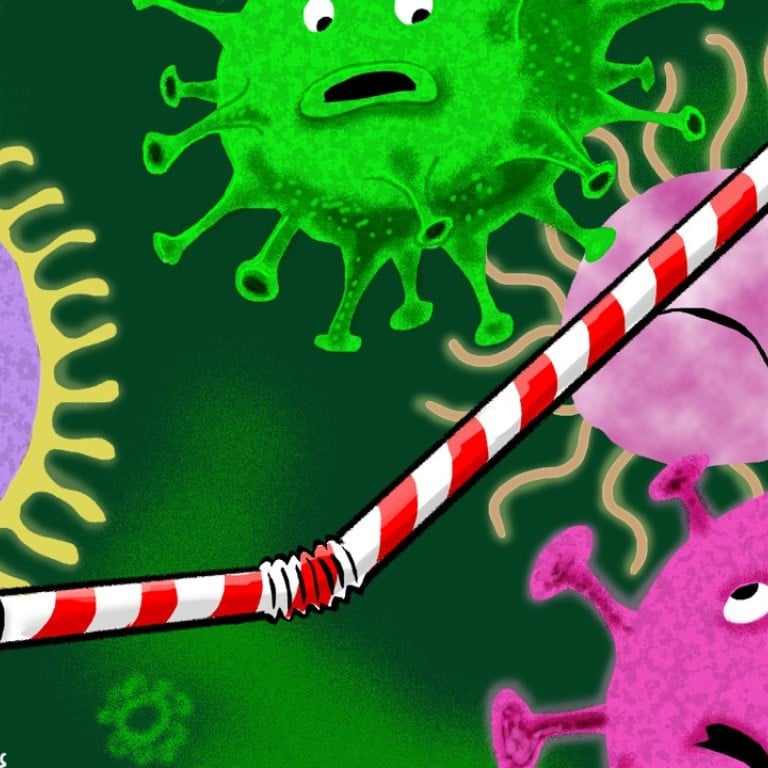
Hong Kong businesses’ plastic addiction shows they don’t care about the communities they serve
Doug Woodring says while legislation is important, in Hong Kong we must start with our consumption habits, and that means getting businesses on board to ban or cut back on single-use plastic. We must all start seeing it as the contagious disease it has become
The United Nations Environment Programme estimates that 8 million tonnes of plastic enters the ocean each year from our consumption habits, and Asia is one of the main areas of pollution, due to high populations, heavy rains (which can carry trash from cities to rivers and the ocean), and poor waste management and recycling infrastructure.
Plastic is virtually impossible to avoid in many cases. It is needed across an enormous spectrum of our lives and technologies, from food preservation to medicines. Its traits of being lightweight and easily moulded make it useful but also place a huge burden on the environment when products are not recovered for recycling or properly managed as waste.
There are technically over 40,000 types of plastic, all of which belong to seven basic “families” of polymers. This wide variety and colour variation, all of which are lightweight and extremely durable, means that when products are lost to the environment, they can cause extensive damage for decades to come.
On a daily basis, more people are affected by trash and dirty water than by climate change. This does not mean that one problem is bigger than the other, but plastic pollution is certainly one of the more complicated issues to solve due to its widespread dispersion.
Watch: Plastic waste chokes Asia’s oceans
Dirty water from trash affects drinking water, causing disease, while the open-pit burning of trash also causes air pollution. Trash also affects fishing and agriculture, causes damage to maritime transport and upsets the ecosystem. The toxicity from broken-up micro plastic also influences our food chain.
There are some easy solutions to reducing the blatant waste caused by single-use plastic. This can be done by simply not using the plastic products which have clear alternatives, or are not even necessary. These would include straws, stirrers, utensils, and plastic bags on single drinks, which McDonald’s continues to serve, against the trend of governments in the region imposing a tax on plastic bags or banning them.
In Hong Kong, the “reflex” from staff, whether at a local dai pai dong or a five-star hotel, is to supply plastic products as part of customer service. In fact, the excuses given for using these items also include convenience and hygiene protection. However, they are no justification for continuing to transfer the costs associated with the trash and the effect on the ecosystem to society.
Watch: British diver swims in sea of plastic off coast of Indonesia
Besides, how valid are those reasons? For example, if hygiene is a concern that necessitates the use of straws, what about the hands that touch the straw before it is placed in the drink?
Yes, we live in a busy city, and people are on the move, but businesses should be more innovative in finding alternatives.
Can legislation play a role? With Hong Kong being a “free market”, it is not likely that legislation will be strong, effective or broad enough in scope to limit or abolish the use of single-use plastic.
Instead, we see high-end restaurants, and even five-star hotels, still using plastic straws and swizzle sticks. The Peninsula Group is an exception, and it should be complimented for leading the way in its announcement this month to ban the use of these items globally.
Switching to alternatives might not save the world but the use of single-use plastics sends a distinct message to customers that the brand, restaurant or bar, and its management, are not “on top of” local and global trends. It shows that their procurement is not thoughtful, and that they do not care enough for the communities they serve to make simple changes.
The decisions that businesses take define the reputation of their leadership. If they continue to sidestep the growing trend of avoiding flagrant waste creation, any extra profit margin that they may get from using plastic is not worth the harm to their reputation.
Watch: Can Hong Kong consumers say no to plastic?
Without legislation to ban this unnecessary waste burden, we have to hope for a renewed sense of pride by restaurateurs and consumers, or somehow to convey a sense of guilt or shame of environmental abuse.
Awareness, thoughtful procurement, and care for the city we live in might lead us to a city of pride where the community reacts to the sight and touch of single-use plastic and unnecessary packaging as if they were apt to catch a contagious disease. In many ways, single-use plastic and packaging is that disease, and it has slowly been absorbed into our daily lives without us realising it over the past 20 years.
Robust legislation restricting its use is absolutely necessary, along with self-reflection within the community, to stop the continued proliferation of single-use materials that simply do not go away.
Doug Woodring is founder and managing director of Ocean Recovery Alliance
